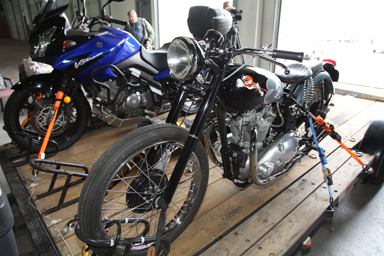Motorcycles and Boats: Tempting Targets for Thieves
Motorcycles: Half the Wheels, but All the Criminal Opportunity
Many motorcycles now cost $20,000, $30,000 or more, making them a valuable target for thieves who either sell stolen cycles whole or strip them down for parts resale. The motorcycle parts market is especially lucrative in colder weather climates where a shorter riding season encourages a stolen parts trade.
Because motorcycle parts, including frames, can be more easily altered, reused and camouflaged than car or truck parts, recovery rates for stolen cycles are lower than for vehicles. Higher-end motorcycles are also highly sought-after luxury items in foreign countries, fostering a lucrative export market for stolen cycles.
Beware of “Cloned” Cycles
Some unscrupulous sellers will “clone” a cycle to sell to an unsuspecting buyer seeking a used motorcycle. They will assemble a cycle from replica aftermarket parts and then sell it as an “original” Harley-Davidson, Honda, Kawasaki, Yamaha, etc. False vehicle identification numbers (VINs) can easily be obtained and applied to cloned cycles.
Motorcycle Fraud and Theft Prevention Tips
- Be wary of used cycles titled or registered as an “assembled vehicle” or described as “all custom;” request an insurance company inspection before buying.
- If possible, get an expert appraisal and/or insurance policy pre-inspection prior to purchasing any motorcycle to make sure you are not getting an assembled “clone” made from aftermarket components.
- Look closely at used cycles for a title history that reveals numerous manufacturers’ statements of origin for major component parts.
- Be vigilant for cycles or major component parts that were allegedly acquired at a “swap meet.”
- When selling your bike, don’t turn over the title until the funds (check or money order) have cleared the bank.
- Use common sense; park in well-lit areas, lock your ignition and remove your keys.
- Lock your cycle even when stored in a garage. You may also want to invest in an alarm system.
- Don’t store your title in your motorcycle’s storage compartment.
- Place unique markings on your motorcycle and take photos of them. If your bike is ever stolen, you use these markings to identify your property.
You can find more information in NICB’s "Motorcycle Theft and Fraud" brochure.
Leave Boat Thieves in Your Wake
Boat theft and fraud cost their owners and insurance companies millions of dollars every year. Like vehicles and motorcycles, stolen boats are frequently sold on the black market or to unsuspecting consumers.
Use NICB’s Boat Equipment Identification Checklist
Every recreational marine vessel made or imported for sale in the U.S. after August 1, 1972, is required to have a hull identification number (HIN). These 12-character identifiers contain a wealth of information for manufacturers, law enforcement agencies and organizations like NICB.
With very few exceptions, all motorboats must have a registration number located on the forward part of the boat. While every state requires vessels to be registered before they can legally operate on their waters, not all states require vessels to be titled prior to registration. Non-titling states create an opportunity for fraud. Check with your insurance company to determine if your state requires a vessel title prior to registration.
Use NICB’s "Boat Equipment Identification Checklist" to keep a record of important information on your vessel. The list covers boat type and model number, description, HIN, color, engine serial number and more. Also, be sure to take photos and video of your vessel and store all of this information in a safe place away from your boat and marina.
Also, more information is available in NICB’s "Boat Theft" brochure.
Tips to Avoid Buying a Stolen Boat
- Make sure the HIN exactly matches the HIN listed on the registration and/or title.
- If the vessel is registered or titled as a “home-built boat,” it should have no manufacturer brand markings.
- Carefully review the vessel and its ownership paperwork for these fraud indicators:
- The boat has been rebuilt.
- The boat has been previously reported stolen, sunk or recovered.
- The title or proof of ownership is a duplicate issue or from out of state.
- Registration numbers appear altered or are not uniform.
- The asking price is well below the market value – if the deal seems too good to be true, it probably is.
- Do not purchase any vessel if the seller is unable to produce title or proof of ownership.
Tips to Keep Your Boat Afloat – Away from Thieves
- Install a kill switch in the ignition system.
- Install an alarm system especially designed for boats.
- Secure your boat to the dock with a locked steel cable.
- Use a trailer hitch lock after parking your boat on its trailer.
- Park your trailer in a locked garage, secured boat storage facility or well-lit fenced area.
- Park the trailer so that the hitch is difficult to reach.
- Use a high-quality chain and lock to secure your boat and trailer to a fixed object, such as a tree.
- Chain and lock detachable outboard motors to the boat.
- Be sure your marine insurance policy includes not only the boat, but also your equipment and trailer.
- Keep a copy of your registration and boat title in a safe place.
Download Motorcycle and Boat Theft Resources
You can find more information in NICB’s "Motorcycle Theft and Fraud" brochure (English or Spanish); NICB's "Boat Equipment Identification Checklist" (English only); and NICB's "Boat Theft: Leave Thieves in Your Wake" brochure (English or Spanish).
These are in PDF format. If you don't have it already installed, download Adobe Reader.

